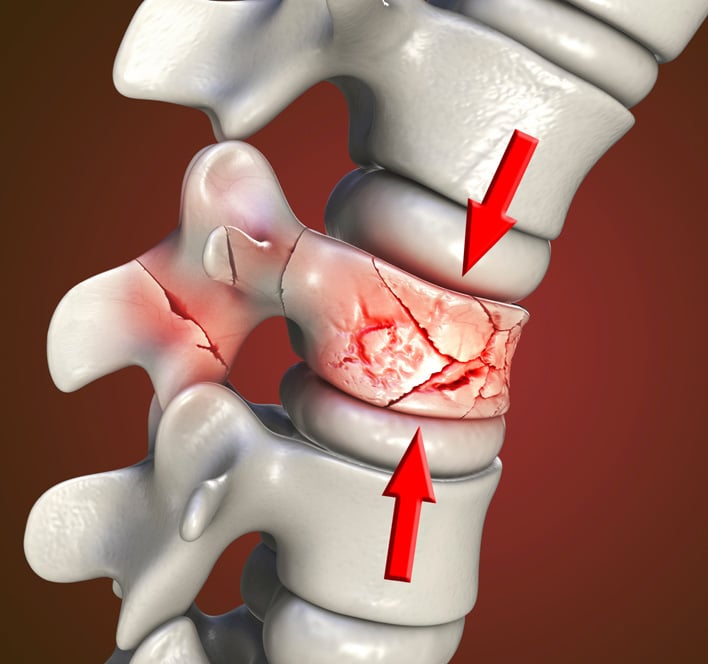Compression fractures are breaks in the vertebrae of the spinal column. If left untreated, these fractures can cause the vertebrae to collapse, making them shorter and potentially causing pieces of bone to press on the spinal cord and nerves. Compression fractures most often occur because of osteoporosis, but traffic accidents, sports injuries, and tumors on the spine can also cause them.
If you are suffering from back pain or you’ve been diagnosed with a spinal compression fracture, you have options for treatment. Getting the right treatment for pain can increase your quality of life and give you the chance to engage in activities and hobbies you’ve given up because of your pain. With treatment for your spinal compression fracture, you can do more than just get through the day, coping with your pain. NJ Spine & Orthopedic can help you with non-surgical and surgical treatment options for spinal compression fractures.
Non-Surgical Treatment Options for Spinal Compression Fractures
Many people with spinal compression fractures do not require surgery. Non-surgical options for treatment can include:
Wearing a Custom Back Brace
Fractures heal best when they are mobilized for some time after an injury. Doctors can apply a cast to broken limbs, but it’s different for fractured vertebrae. Most doctors insist patients with a spinal compression fracture wear a back brace to support their back during healing.
Modifying Normal Activity
You can expect your doctor to restrict your activity for some time after you’ve been diagnosed with a spinal compression fracture. In most cases, doctors recommend that patients with a spinal compression fracture avoid high-impact activities, exercise, and sports.
However, fractured vertebrae have a better chance of healing with activity that increases blood flow throughout the body. Therefore, non-surgical treatment for spinal compression fractures typically involves low-impact activities, such as walking and stretching.
Taking Over-the-Counter (OTC) and Prescription Pain Medication
Spinal compression fractures often cause severe pain, especially if the break happened during a fall or accident. Pain management is typically a large part of non-surgical treatment. Doctors often prescribe pain medication to provide relief during the healing process. Painkillers do not help with healing, but they can help patients move more freely and participate in low-impact activities as their fracture heals.
Surgical Treatment Options for Spinal Compression Fractures
After exhausting nonsurgical treatment options, those who continue to suffer from chronic pain related to a spinal compression fracture might be looking at surgery as the next step. Doctors generally use three main surgical procedures to treat spinal compression fractures: vertebroplasty, kyphoplasty, and spinal fusion.
Vertebroplasty
Vertebroplasty is a minimally-invasive surgical procedure that is used to relieve pain and stabilize a spinal compression fracture. During the procedure, a surgeon inserts a needle into the fractured vertebrae and injects a bone cement mixture. After about 10 minutes, the mixture hardens and stabilizes the fracture.
Kyphoplasty
Kyphoplasty also uses a bone cement mixture to treat a spinal compression fracture and reduce pain. However, this procedure focuses on correcting a bone deformity instead of stabilization. During the surgery, a surgeon inserts a thin tube through the back of a damaged vertebrae and inflates a small balloon to create a space for the bone cement mixture.
Spinal Fusion Surgery
Sometimes, doctors treat spinal compression fractures with spinal fusion surgery, but it is typically the last resort when other treatment options aren’t successful. This procedure eliminates movement between two vertebrae by connecting them together until they naturally fuse together. This can put more pressure on other vertebrae and cause additional fractures, so it’s not right for everyone.
Contact the Experienced Back and Spine Specialists at NJ Spine & Orthopedic Today
Spinal compression fractures, regardless of their cause, can cause chronic pain. Several treatment options exist to get some relief. The experienced back and spine specialists at NJ Spine & Orthopedic can discuss surgical and non-surgical treatment options that are best for you.
We work with various insurance providers and our experienced surgeons have taught other surgeons groundbreaking techniques. Contact us online or call us at (866) 553-0612 to learn more about the best treatment option for your spinal compression fracture.

